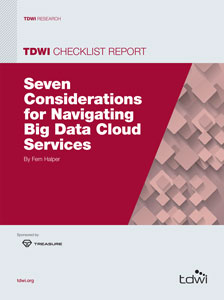
TDWI Checklist Report | Seven Considerations for Navigating Big Data Cloud Services
February 18, 2014
As disparate kinds of data continue to explode in terms of size and
velocity, organizations are looking for ways to manage and gain the
most value from this big data. Big data includes everything from
transactional data and clickstreams to Web logs and sensor data. It
is often multi-structured. It can be used to solve different problems.
Sometimes the challenge is a real-time business problem such as
analyzing sensor data for common equipment failure patterns and
sending alerts when those patterns start to appear. Other times it
might be integrating data from both on- and off-premises sources.
Regardless of the use case, companies are realizing that cloud
services can provide value for big data.
The cloud provides scalable storage, computing power, and elastic
resources. It is a large-scale distributed computing environment—an important consideration for big data. The cloud can scale as data
grows, be implemented rapidly, and be spun up or down quickly,
which can provide flexibility. Thus, the cloud can be an important
part of a big data ecosystem. TDWI is seeing more companies start
to increase their use of cloud services, particularly in hybrid cloud
models. The hybrid cloud is a computing environment that includes
the use of public and private clouds where there are one or more
touchpoints between systems.
As companies begin to embrace the cloud for big data, they are also
trying to navigate cloud services. A range of services can support
big data. These run the gamut from bare-metal infrastructure-as-a-service
(IaaS) to cloud data warehouses to full-service providers. To
make the most out of big data using the cloud, an enterprise must
be able to move, manage, and analyze data while ensuring data
integrity. Some cloud providers offer only pieces of this functionality;
others offer more comprehensive, managed solutions.
This Checklist Report focuses on helping organizations understand
key considerations and best practices for utilizing cloud services for
big data. These include both data and business issues.